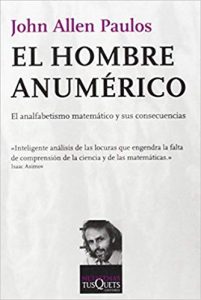 We owe John Allen Paulos some highly recommendable books of mathematical popularisation, including Innumeracy (El Hombre Anumérico in its Spanish translation). It is precisely in this work that Paulos confessed how important his middle name, Allen, was for a time, as it had the invaluable function of ensuring that in the Anglo-Saxon world he was not confused with the Polish Pope.
We owe John Allen Paulos some highly recommendable books of mathematical popularisation, including Innumeracy (El Hombre Anumérico in its Spanish translation). It is precisely in this work that Paulos confessed how important his middle name, Allen, was for a time, as it had the invaluable function of ensuring that in the Anglo-Saxon world he was not confused with the Polish Pope.
Paulos has great skill in showing how probabilities can be used to avoid being manipulated by the statistics with which we are so often flooded everywhere, from politicians to the media, via the infinite forums of the social networks (a danger of which Martín Caparrós also warned us so succinctly and masterfully in his magnificent book Hunger: “But we know that numbers are also the refuge of certain scoundrels”; see the post Hunger and numbers). And this is especially important in a world that is doomed to the abuse of massive data and its management by algorithms. However disinterested the statistical treatment given to the data –which is rarely the case– however honest the algorithm that uses it to recommend this or that purchase –which is rarely the case– we should not forget the irrelevance that often affects the data in question, because as Paulos wrote in Innumeracy:
Any bit of nonsense can be computerized —astrology, bio-rhythms, the I Ching— but that doesn’t make the nonsense any more valid.
References
Innumeracy: Mathematical Illiteracy and its Consequences. Hill and Wang. 1988.

Leave a Reply